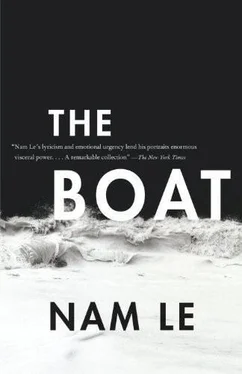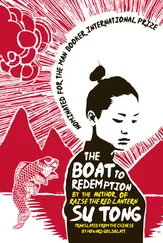Truong started singing. Softly — to himself — so softly she wouldn't have heard him if her ear hadn't been inches from his mouth. She gradually shifted her arm down so she could hear better. He sang the ballad from the third night. She listened, hardly daring to breathe, watching the now-darkening sky knitting together the rigs and cables of the crane above them as though they were the branches of trees.
When he finished, the silence that surged in afterward was unbearable. Mai reached across her body and gently took hold of his arm.
"Who taught Child how to sing like that?"
He didn't answer.
***
THE NEXT MORNING, back below deck, she woke up to find a puddle of vomit next to his curled-up, sleeping body. It gleamed gray in the early light of dawn.
"The child has the sickness," a voice said without a second thought. It was one of the old women who had camped with them beneath the companionway stairs. The hatch was open and light flowed in like a mist, dimly illumining the three other bodies entangled in their nook. The deeper recess of the hold remained black.
"No, he doesn't," said Mai.
"Poor child. He is not the last. Such a pity."
"Be quiet!" Mai covered her mouth, abashed, but no one reproached her. Several bodies stirred on the other side of the stairs.
Barely awake, Quyen rolled over to her son and propped herself up on an elbow. She brushed his cheek with her knuckles. For a second, in the half-light, Mai thought she saw an expression of horror move across her friend's face.
"Child is sorry," Mai murmured to the old woman.
Truong's eyes were glazed when he opened them. He looked like a burnt ghost. He leaned over, away from his mother, and dry-retched. There was nothing left in him to expel. Another of their neighbors, a man who smelled of stale tobacco, averted his legs casually.
"What it can do to you," the old woman said, her gums stained crimson from chewing betel leaves, "the ocean."
"Does Child's stomach hurt?" asked Mai.
"Yes."
"What it can steal from you and never give back. My husband, both my daughters." "It's just a stomach-ache," said Quyen, then looked up as though daring the old woman — or anyone — to disagree. A gang of eyes, unmoving, inexpressive, watched them from the shadows.
That evening, Anh Phuoc ladled out the last rations of water. He shuffled wearily through the boat, repeating the same account to anyone who stopped him, intoning his interlocutors' names as though that were the only consolation left him to offer them. Weak moans and thick silences trailed him.
When Mai poured her ration into Truong's cup, Quyen frowned, and then flinched away. "Thank you," she said at last. For the first time she used the word for "younger sister."
"It's nothing. I already took a sip."
"Poor child," repeated the old woman, shaking her head.
Truong took some water in, then coughed some of it out. People looked over. In the dusk light his face was pallid and shiny.
He opened his mouth. "Ma," he said.
"I'm here," said Quyen.
"Ma."
Quyen bit her lips, wiped the sweat from Truong's brow with a corner of her shirt. Finally his eyes focused and he seemed to look straight at Mai.
"It's so hot," he said.
" Thoi ," said Quyen, dabbing above his eyes, around his hairline.
"I want to go up."
"Sleep, my beloved. My little prince. Sleep."
Mai wanted desperately to say something to him-something useful, or comforting-but no words came. She got up to close the hatch door.
The old woman took out a betel leaf and inserted it into the slit of her toothless mouth.
***
HIS SICKNESS FOLLOWED the usual course. Muscle soreness and nausea in the early stages. That evening his blisters began to rise, some of them bleeding pus. He became too weak to swallow water.
In the middle of the night, Mai woke to find Truong half draped over her stomach. His weight on her so light as to be almost imperceptible, as though his body were already nothing more than bones and air. "Everything will be fine," she whispered into the darkness, her thoughts, still interlaced with dream, scattered remotely across space and gray sea. Back home she'd slept on the same mat as Loc. Her mother by the opposite wall. She reached down and touched Truong's brow.
He stirred awake.
"Is Child alright?"
"I want to go up."
The skin on his face was hot and moist. Mai lifted her eyes and noticed Quyen, mashed in the shadow of the companionway steps, staring at both of them.
"Take him," she said dully.
Mai found a spot for them by the pilothouse, surrounded by sleeping families. When dawn came, Truong's head slid with a slight thud onto the planking. Half asleep, Mai sought his shoulder, shook it. His body gave no response. She sat up and shook him again. His clothes stiff with dried sweat. Nothing.
"Truong," whispered Mai, feeling the worry build within her. She poked his cheek. It was still warm — thank heavens! — it was still warm. She checked his forehead: hotter than it had been last night. He was boiling up. His breath shallow and short. With agonizing effort she cradled his slight, inert body and bore him up the stairs into the pilothouse.
Anh Phuoc was slumped underneath the tiller, sleeping. Three infants were laid out side by side on the floor, swaddled in rags.
He woke up. "What is it?" He saw Truong in her arms. "Where's Quyen?"
She laid him down. Then she turned to find Quyen.
"Wait." Anh Phuoc got up, surveyed the boat through the windows, then retrieved a flask from behind the bank of gauges. He unscrewed the cap and poured a tiny trickle of water into a cup. "This was for them," he said, gesturing at the motionless babies. "How they've lasted twelve days I don't know." He screwed the flask cap back on and then, with tremendous care, handed her the cup. "But they won't make it either." He paused. "Let me find Quyen."
Truong wouldn't wake up. Mai dipped one finger into the cup, traced it along the inner line of his lips. Once it dried she dipped her finger again, ran it across his lips again. She did this over and over. One time she thought she saw his throat twitch. His face — vthe burnt, blistered skin, its spots and scabs — the deeper she looked, the more his features dissociated from one another until what she looked into, as she tended him, was not a face, but a brown and blasted landscape. Like a slow fire it drew the air from her lungs.
Commotion on deck. Someone shouting. She jolted awake, checked Truong — he was still unconscious, his fever holding. A weird tension suffusing the air. Another death? Mai opened the pilothouse door and asked a nearby woman what was happening.
"They saw whales," the woman said.
"Whales?"
"And then land birds."
It was as though she were sick again, her heart shocked out of its usual rhythm. "Land? They saw land?"
The woman shrugged.
All at once Quyen burst out of the hold, her hair disheveled and her eyes watery and red. She spotted Mai.
"Here!" Mai called out excitedly. "Chi Quyen, here!" She stood on tiptoes and scanned all the horizon she could see. Nothing. She looked again. "Someone said they saw land," she announced aloud. Realizing people were scowling at her, she turned toward Quyen. Too late she caught a new, rough aspect in her eyes. Quyen strode up into Mai's face.
"Where's my son?" She pushed into the pilothouse. Mai stumbled back, tripping over the doorsill.
Inside, Quyen saw Truong and rushed toward him, lowering her head to his. She emitted a throaty cry and twisted around to face Mai.
"Stay away," she declared. "You've done enough!" Her voice was strained, on the verge of shrillness.
"Chi," gasped Mai.
"I've changed my mind," Quyen went on, the pitch of her words wavering. Her expression was wild, now — cunning. "He's my son! Not yours — mine!"
Читать дальше











